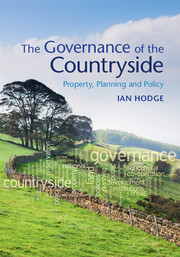Book contents
- Frontmatter
- Contents
- Preface
- Acknowledgements
- List of abbreviations
- Part I Introduction
- Part II Historical models
- Part III Governance under sectoral policies
- Part IV Alternative approaches to governance
- 13 Reconstituting markets
- 14 Coordination, cooperation and collective action
- 15 Public land ownership
- Part V Conclusions
- References
- Index
14 - Coordination, cooperation and collective action
from Part IV - Alternative approaches to governance
Published online by Cambridge University Press: 05 February 2016
- Frontmatter
- Contents
- Preface
- Acknowledgements
- List of abbreviations
- Part I Introduction
- Part II Historical models
- Part III Governance under sectoral policies
- Part IV Alternative approaches to governance
- 13 Reconstituting markets
- 14 Coordination, cooperation and collective action
- 15 Public land ownership
- Part V Conclusions
- References
- Index
Summary
The prisoners in the famous dilemma cannot change the constraints imposed on them by the district attorney; they are in jail. Not all users of natural resources are similarly incapable of changing their constraints. As long as individuals are viewed as prisoners, policy prescriptions will address this metaphor. I would rather address the question of how to enhance the capabilities of those involved to change the constraining rules of the game to lead to outcomes other than remorseless tragedies.
Elinor Ostrom (1990) Governing the Commons. Cambridge University Press, Cambridge (p. 7)…a core goal of public policy should be to facilitate the development of institutions that bring out the best in humans.
Elinor Ostrom (2010) Beyond markets and states: polycentric governance of complex economic systems. American Economic Review 100(3), pp. 641–672, at p. 665The changes in farming through the 1950s to 1980s, described in Chapter 6, can be seen as a period of modernisation. A particular model of agricultural development, of increasing output and productive efficiency through new technology, enterprise expansion and the concentration of farms into larger units, was developed and promoted by policy. This more industrial approach was associated with an individualisation in farm business, typically with limited linkages amongst farms within a particular locality, in contrast with our earlier models of common fields or the Great Estates. This approach increased the potential for the exploitation of economies of size through specialisation, and enabled farms to become more technically efficient; but as we have noted, it also had detrimental impacts on the environment. While local horizontal linkages have declined, there has been a move towards market-oriented vertical linkages with other firms along the food production, processing and marketing chain. Farmers have become increasingly dependent on purchased inputs and on contracts for the sale of their output, generally with large processing and retail companies.
However, the redirection towards farming systems that are more environmentally benign, that promote landscape and wildlife or provide public access, especially with a goal of increasing production at the same time, may be expected to imply a need for rather different sets of institutional relationships, in the same way that the declines of the common fields or of the Great Estates led in their turn to new institutional arrangements.
- Type
- Chapter
- Information
- The Governance of the CountrysideProperty, Planning and Policy, pp. 296 - 319Publisher: Cambridge University PressPrint publication year: 2016

